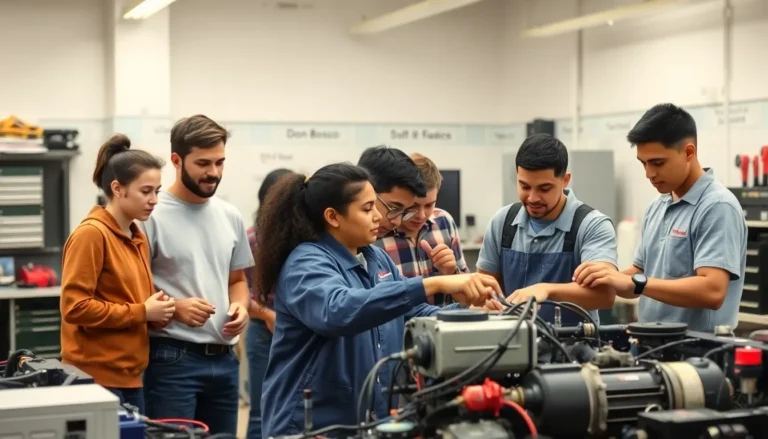Finding the right EKG tech program can feel like searching for a needle in a haystack—if that needle could read hearts and diagnose arrhythmias. With the healthcare field booming, now’s the perfect time to jump into this rewarding career. EKG technicians play a vital role in monitoring patients’ heart health, and the demand for skilled professionals is higher than ever.
But how do you sift through the options? Luckily, there are plenty of EKG tech programs near you that can turn your passion for healthcare into a thriving career. Whether you’re looking for flexible schedules or hands-on training, there’s something for everyone. So grab your metaphorical stethoscope and let’s dive into the world of EKG tech programs that’ll have you saying, “I love my job!” in no time.
Table of Contents
ToggleOverview of EKG Tech Programs
EKG tech programs focus on training individuals to monitor and interpret heart activity through electrocardiograms. Aspiring technicians engage in coursework that covers anatomy, physiology, and the use of EKG machines. Real-world simulations play a crucial role in helping students develop important skills.
Hands-on training enhances understanding and prepares students for various environments, including hospitals and clinics. Programs often include clinical internships, which provide valuable experience and networking opportunities. Experienced instructors deliver lessons aligned with current industry standards, ensuring that students receive relevant education.
Many EKG tech programs offer flexibility to accommodate different schedules, making them accessible for working individuals. Online courses complement in-person training, offering options for those who prefer a self-paced learning environment. Institutions frequently provide career services, assisting graduates in finding job placements.
Certification options vary by location, and several organizations offer credentials that enhance employability. The National Certification Agency for Medical Imaging and Radiation Therapy provides recognized certifications for EKG technicians. Obtaining certification often leads to higher job prospects and increased earning potential.
Cost of programs typically ranges from $1,500 to $10,000, depending on the institution and length of the course. Financial aid options and scholarships may be available to support students in managing expenses. Choosing the right program involves evaluating specific needs and career goals to ensure the best fit.
Benefits of EKG Tech Programs

EKG tech programs provide valuable training and opportunities in the healthcare sector. Graduates benefit from a range of career pathways, skill development, and certifications.
Career Opportunities
Career opportunities for EKG technicians continue to grow due to increased healthcare demand. Hospitals, outpatient clinics, and diagnostic facilities seek qualified professionals to monitor patients’ heart health. Many graduates secure positions as EKG technicians, cardiac monitoring technicians, or cardiovascular technologists. Each role offers competitive salaries, with EKG technicians averaging around $57,000 annually according to the U.S. Bureau of Labor Statistics. Networking during clinical internships often leads to job placements, expanding professional relationships. Program graduates frequently find opportunities in their local healthcare markets, increasing their chances of employment soon after finishing their education.
Skill Development
Skill development occurs throughout EKG tech programs, which focus on both theoretical knowledge and practical experience. Coursework covers essential topics such as human anatomy, physiology, and EKG machine operation. Hands-on training with real-world simulations enhances the learning experience, allowing students to practice before entering the workforce. Mastery of EKG interpretation becomes critical, as it enables technicians to identify abnormalities in heart rhythms. Experienced instructors guide students through rigorous training, ensuring they meet current industry standards. Continuous learning opportunities can help graduates maintain certification and advance their skills, keeping them competitive in a dynamic job market.
How to Find EKG Tech Programs Near Me
Finding EKG tech programs nearby involves utilizing various resources to identify suitable options. Several avenues offer extensive information on available programs in local areas.
Online Resources
Online platforms serve as valuable tools for researching EKG tech programs. Websites like CareerOneStop and the National Healthcareer Association provide directories of accredited institutions. Utilizing search engines allows individuals to explore reviews and testimonials from current and former students. Social media groups dedicated to healthcare careers create networking opportunities and insights into programs. Many organizations post updates about local training options, ensuring prospective students stay informed.
Local Community Colleges
Local community colleges frequently offer affordable EKG tech programs tailored to varying schedules. Many of these institutions provide flexible course formats, including evening and online classes. Enrollment in community college programs can lead to certification, enhancing employment prospects. Experienced instructors teach relevant courses such as anatomy and EKG procedures. Access to local clinical internships often improves hands-on training and valuable networking. Additionally, community colleges frequently offer financial aid options, making education accessible to a wider audience.
What to Look for in an EKG Tech Program
When selecting an EKG tech program, several key factors significantly impact the quality of education.
Accreditation and Certification
Accreditation ensures the program meets industry standards. Programs endorsed by recognized bodies, such as the Commission on Accreditation of Allied Health Education Programs, offer credibility. Seeking certification from reputable organizations, including the National Certification Agency for Medical Imaging and Radiation Therapy, enhances career prospects. Additionally, employers often prefer candidates from accredited programs, highlighting the importance of this aspect.
Curriculum and Hands-On Training
Curriculum quality varies across different institutions. Look for programs that provide comprehensive courses on human anatomy and EKG machine operation. Hands-on training proves essential for skill acquisition, allowing students to practice in real-world scenarios. Engaging with experienced instructors who emphasize current industry practices adds value. Lastly, internships integrated into the coursework offer networking opportunities, connecting students to potential employers in the field.
Exploring EKG tech programs can open doors to a fulfilling career in healthcare. With the increasing demand for skilled professionals in this field, individuals have the opportunity to make a significant impact on patient care. By considering factors like program flexibility, hands-on training, and accreditation, prospective students can find a program that aligns with their goals.
Networking during clinical internships and leveraging career services can enhance job prospects after graduation. As the healthcare landscape continues to evolve, pursuing a career as an EKG technician offers not only job security but also the chance to contribute meaningfully to heart health. Taking the first step toward this rewarding path starts with finding the right program nearby.




